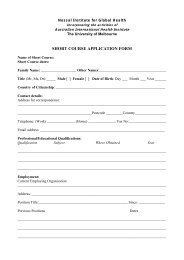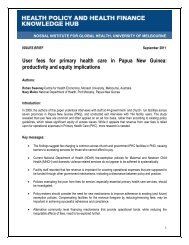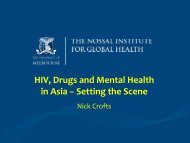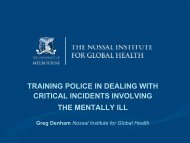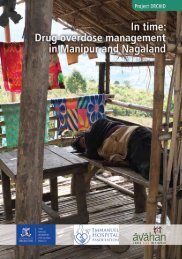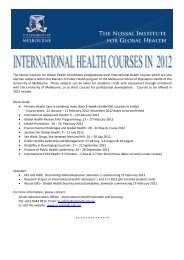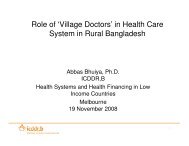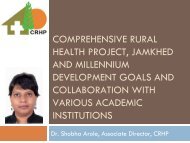AN INTRODUCTION TO MENTAL HEALTH - The Nossal Institute for ...
AN INTRODUCTION TO MENTAL HEALTH - The Nossal Institute for ...
AN INTRODUCTION TO MENTAL HEALTH - The Nossal Institute for ...
You also want an ePaper? Increase the reach of your titles
YUMPU automatically turns print PDFs into web optimized ePapers that Google loves.
INFORMATION FOR PRESENTATION<br />
Common Mental Disorders<br />
People with Common Mental Disorders usually experience physical, emotional, thinking<br />
and behaviour symptoms, but not imagining symptoms.<br />
Some people may get treatment <strong>for</strong> physical problems associated with their illness (like<br />
poor sleep or appetite), but neglect the cause of these physical problems such as underlying<br />
depression or anxiety.<br />
People with Common Mental Disorders are often not treated because it is more<br />
difficult <strong>for</strong> family members and health workers to recognise that they are suffering<br />
from a mental disorder.<br />
<strong>The</strong> main Common Mental Disorders are:<br />
1. Unusually sad mood that does not go away – this is called depression<br />
2. Excessive fear, nervousness and worry – this is called anxiety<br />
3. Excessive use of alcohol or other substances– this is sometimes called substance abuse<br />
1. Unusually sad mood that does not go away (depression) is a mental disorder when the<br />
symptoms last <strong>for</strong> at least two weeks and they affect the person’s ability to carry out his/<br />
her work or have satisfying personal relationships. Everyone can feel sad when bad things<br />
happen, occasional sadness is not depression. 2,5<br />
<strong>The</strong> symptoms of depression include unusually sad mood, and all or some of the<br />
following:<br />
• loss of interest and enjoyment in activities<br />
• tiredness and lack of energy<br />
• loss of self confidence<br />
• feelings of hopelessness and helplessness<br />
• wishing they were dead<br />
• difficulties in concentrating<br />
• sleeping problems<br />
• loss of interest in food and loss of weight<br />
• experiencing a range of physical complaints that have no apparent medical cause e.g.<br />
weakness, aches & pains.<br />
Not every person who is depressed has all these symptoms, and the severity of depression<br />
is different <strong>for</strong> different people.<br />
Events that contribute to the development of an unusually sad mood include:<br />
• Distressing events that the person can not do anything to control like the death of a<br />
38<br />
<strong>AN</strong> <strong>INTRODUCTION</strong> <strong>TO</strong> <strong>MENTAL</strong> <strong>HEALTH</strong>



